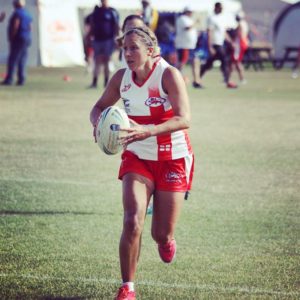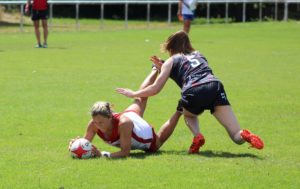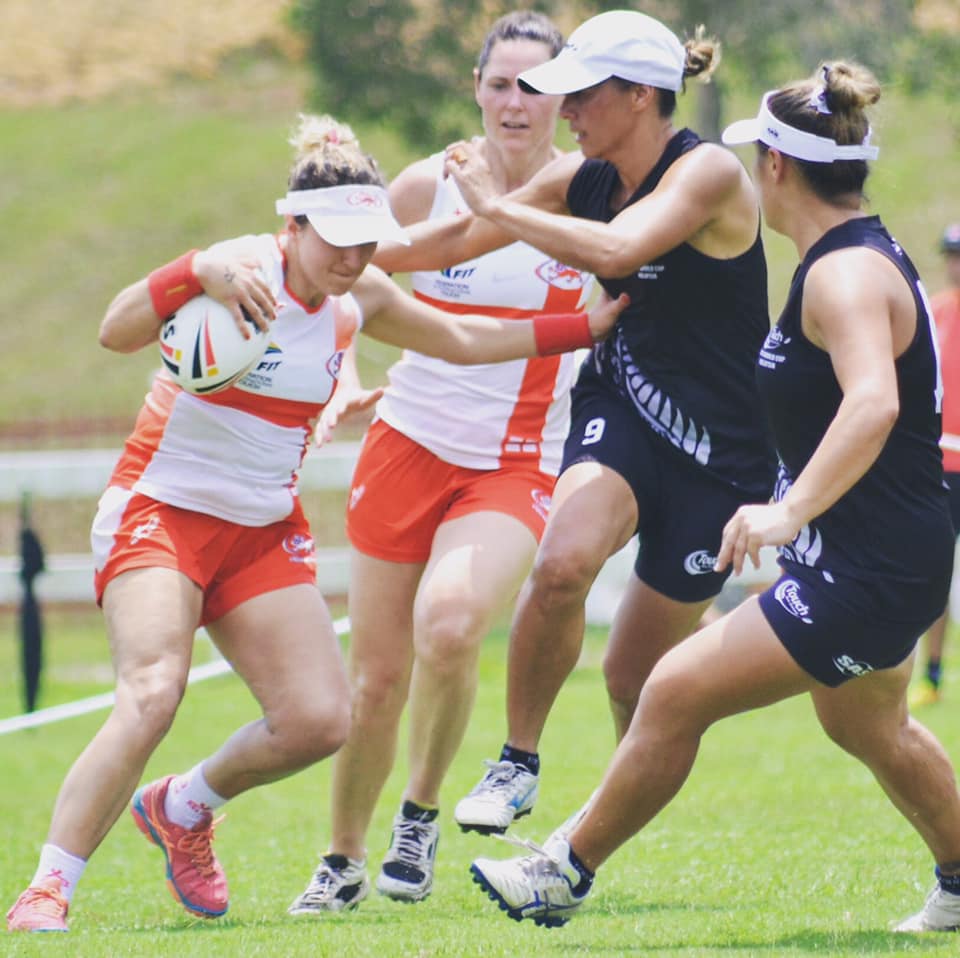Written by Sarah Bellew, Head of Communications and Engagement at Women in Sport.
Sarah also plays touch rugby for England, and in this piece she reflects on the impact of the Rugby Union and Rugby League World Cup

Sport can be a cruel place, there are highs and lows, winners and losers. It is a never-ending rollercoaster. For England women’s rugby teams, their respective World Cup campaigns ended in heartbreak this week at the hands of New Zealand. They may be different codes, one professional and one amateur, but the similarities far outweigh the differences. These are women who grew up in a society that told them that rugby was not a place for them and they have now undeniably proved it is. The impact of the two tournaments is far bigger than the result of one final or semi-final. This has been about the roar of the record-breaking crowds, the joy on the faces of little girls watching these titans of the game, prime time television coverage and the knowledge that momentum is growing and that attitudes are shifting.
We’ve come a long way since 1991 when four pioneering women; Deborah Griffin, Sue Dorrington, Alice Cooper and Mary Forsyth took it upon themselves to organise the first Women’s Rugby Union World Cup. They did so without the backing of the then International Rugby Board who told them women’s rugby is a ‘participation and not a spectator sport’. Working around the clock, alongside holding down full-time jobs and with no sponsorship they pulled off the seemingly impossible. An estimated 3,000 people saw the United States beat England in the final in Cardiff.
Soon after, in 2000, Jackie Sheldon and a squad of trailblazers also made incredible sacrifices to put women’s rugby league on the world stage. Devoid of any funding the team held bucket collections and even appeared on a game show with Cilla Black to raise money for the tournament.
What drove these women was a love of the game, a desire to show that rugby is not the preserve of men and to inspire more girls to play. They were united in a battle against outdated attitudes.
Shifting the Stigma

Women’s rugby challenges stereotypes both on and off the field. It shows girls that they can and do have a place in the sport, they can be passionate, strong and powerful, and competitive and relentless in pursuit of a goal. It’s tough and physical but bruises heal and just like men, women too can put their bodies on the line for sport.
But as young girls we are not encouraged to dive on the floor, skid on our knees, get dirty or enjoy rough and tumble play. For me, when learning to play touch rugby in my early twenties I had to overcome a fear of diving on the ground. It just wasn’t something I’d ever done as a young girl and playing netball and hockey it was helpful to stay on your feet. Until that point too, I’d barely even handled a rugby ball.
Initial reservations aside, I quickly developed a passion for the sport. There is something so liberating running around outdoors and whilst the game is in flow any external pressures don’t matter. Your sole focus is, and has to be, in the moment. It is also incredibly unifying, one person cannot win a game on her own, the team must work as a unit. More experienced players support newer players to learn and develop, which is extraordinarily empowering. Whether you score, assist a score, prevent a try or work hard to move the ball up the field, you’ve made an impact on the game.
Touch took me on a journey from a muddy park in Manchester to Malaysia, where in 2019 I was part of England Women’s over 35s touch team competing in the World Cup in Kuala Lumpur. We too were making history – it was the first time the division for women had existed.

Sarah playing for England against New Zealand in the 2019 Touch World Cup
I can certainly relate to the sacrifices these pioneers made for the love of rugby. I must fit my training in around work and family life, travel around the country at my own cost for training weekends and pay for the honour of representing my country. Not even the shirt is free.
We also lost to New Zealand in the semi-finals. A defeat we are determined to rectify in 2024 and close the gap on the dominance of the southern hemisphere. We are going for gold and we also want to show women they can play at a competitive level for longer.
The power of team
Watching the women in both World Cups has showcased the collective power of a team. Prior to the World Cup final defeat the Red Roses had enjoyed a 30-game winning streak. They looked unstoppable. After the game captain Sarah Hunter said: ‘We’re as one. We win together and lose together. There is no blame culture in this team. We’re all accountable for whether we win or lose.’
Team sport teaches resilience, communication, teamwork, leadership, respect, discipline, mental endurance – all attributes I’ve learned through playing rugby and taken into my professional career. In sports teams everyone has a job to do, you trust the player next to you to do theirs and you know they have your back, whatever the outcome. It’s a special feeling.
Yet, in the UK many fewer girls play team sport than boys. It is the biggest gender gap in sports participation and one that the charity Women in Sport is determined to close.
Neither England team came away with a trophy this Autumn but they achieved something far greater. They have inspired girls and shown them that rugby is a place for them. They have proved that women’s rugby can draw huge crowds and sparked debate around greater investment in the game. The flywheel is firmly in motion within the sport, but society has some catching up to do.
We can all play a part in challenging gender stereotyping and make sure girls aren’t limited by societal expectations. We can call ourselves out each time we tell our daughters to be careful and our sons to be brave. Our future Rugby World Cup Champions are not “good girls”, delicate and fragile, tidy and clean. They are strong, bold, brave and powerful – and they have very muddy knees.




